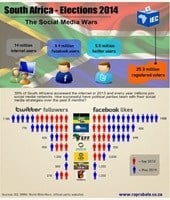Brazil
83 million Brazilians use Facebook at least once a month as Brazil gears up for a presidential poll in October. Just before Dilma Rousseff was elected president in 2010, only 6 million Brazilians used the social networking site monthly. Comparatively, only India and the US have bigger Facebook populations. Having said this, social networking has become a battlefield in the election leading up to the official campaign that starts on 6 July.
Brazil also utilises free television time during the campaign trail, using a complex formula which considers the size of the electoral alliances. Despite backlash from the ruling coalition PT's junior partner to disembark from Rousseff's ruling party and take its airtime with it, most in the know seem to think that the coalition will pull through. This will give the president almost half of the 25-minute television slots, whilst the other candidates will split the rest.
In the meantime however, opposition parties have been capitalising on the television deficit by making friends on Facebook, with youngsters being the big target demographic. Nearly 80% of Brazilians aged 16 (legal voting age) to 25 use the internet at least once a week and almost half go online daily. This is 47% above the national average.
To have greatest effect, however, the candidates must also do well in the battle of television, watched by 65% of Brazilians every day of their lives.
Throughout both the 2008 and 2012 Obama campaigns, an enormous amount of small-dollar donations were received compared to presidential elections preceding them and swelled to make up a notable portion of the funding. Obama's opponents however, received larger donations from fewer number of people in both election years but Obama managed to work larger crowds of followers than his opponents.
A Publius Project study illustrates that the Obama campaign cut across various demographics with 59% women, 17% Latino and 44% that identified as non-white. In addition to this, Obama followers were less experienced than that of McCain supporters in 2008. Ninety percent of McCain's supporters voted in the 2004 election and only 80% of Obama supporters had voted in that same election.
The question is, how did Obama manage to mobilise such a profound number of people - enough (with a smaller voter turnout) to secure him the presidential seat? Simply put his campaign team had the impetus to drive social media as a primary campaigning tool to mobilise followers and support.
In Rahaf Harfoush's book, Yes We Did!: An Inside Look at How Social Media Built the Obama Brand, he delves into all of the components of my.barackobama.com, the website used to mobilize citizens during the 2008 election. Commonly referred to as "MyBO," the site ended up with more than three million registered accounts, all equipped with tools to help mobilize for Obama.
Furthermore, people could connect with users who shared similar interests and this resulted in sub-groups forming, such as Electricians for Obama (occupation), Texas for Obama (location), and Women for Obama (demographic). The new media team also announced that members of Obama's policy team would respond to any questions or concerns proposed by users, another way in which Obama's campaign team used social networking to speak directly with its followers and keep the conversation going.

"South Africans did embrace social media for sharing political statuses, tweets and social media, particularly online video (The DA's Ayisafani had over 700,000 YouTube views) from political parties and political leaders," says Rhodes University's Jude Mathurine, lecturer/co-ordinator of new media at the School of Journalism and Media Studies.
He goes on to say that although South Africans embraced social media in a personal capacity to air their political views, there was no definitive data on whether social media had any sort of impact on voter patterns, as was illustrated in the US presidential campaigns in 2008 and 2012 and that social media is largely used as a broadcast platform by political parties and leaders.
The size of our audience compared to that of Brazil and the US is miniscule, but cannot be discounted because of its relativity to the size of South Africa, access to internet and number of mobile users.
An image speaks 1000 words, stood true for the 2014 election where citizen photography ruled the day. South Africans celebrated their democratic right to vote by posting selfies of their marked thumbnails, whilst politicians took to Twitter and Facebook.
The DA fared the best with the highest level of engagement within Facebook and also delivered the best integrated media campaign with the controversial Ayisafani TV and YouTube campaign.
But top honours went to the ANC in terms of political rallies. The synergy between digital media and rallies was evident during the ANC's Siyanqoba rally when they made free WiFi available inside the FNB Stadium. The party's online support base was clear with growth in both Facebook and Twitter and the biggest growth spurt occurring the weekend before voting as a result of this event.
"EFF's and Julius Malema's official social media audience was built from scratch over a period of a year and showed exponential growth. How this translates into votes is anyone's guess. One would still have to look at data around the elections to see which political party's names or hashtags were most mentioned or used, or whose content was most often retweeted to determine who performed best," says Mathurine.
Twitter growth belonged to DA and specifically to Helen Zille who posted an impressive 7.5 tweets an hour, or one tweet every 8 minutes, per day for a 12-hour day in the third week of April, according to Apurimac research.
On the other side of the political fence, the ANC saw the biggest Facebook growth and their Facebook audience overtook their Twitter audience which eventually overtook the DA's Twitter audience, which exceeded other parties' at the start of the campaign.
In the up-coming elections, forecasters say that changes to the cost of mobile communication will enable a mobile media election as opposed to a social media election with the use of mobiles being far more prolific in our local context.
News24 reported record-breaking user stats during the elections. Voting day saw 1.7 million unique users and 22 million page views on results day, 625,000 unique users and 4 million page views on voting day. The growth is unprecedented with 220% increase in unique users and 484% growth in page views.
"When we started our planning for Elections 2014 we knew that we wanted to surpass all local benchmarks from a development and user perspective," says Cathryn Reece, product development manager for 24.com.
At 10am the site reached its peak with 102,000 concurrent views (the number of people online at the same time). This broke their previous record of 79,000 concurrent views which they received on 19 February 2013, the day of Oscar Pistorius' bail hearing.
The interactive results map was the clear-cut winner on the day. It collected over a third of the total web and mobile traffic.
Overall, social media in the South African context did not live up to the hype preceding the elections. Results illustrate that the general public follow people and not parties - personalities in the South African political landscape carry more (social) weight than utterances about policy, for instance.
Those in the know state that parties in up-coming elections need to focus on an integrated mobile campaign to successfully carry their messages and position party leaders in the social realm.
